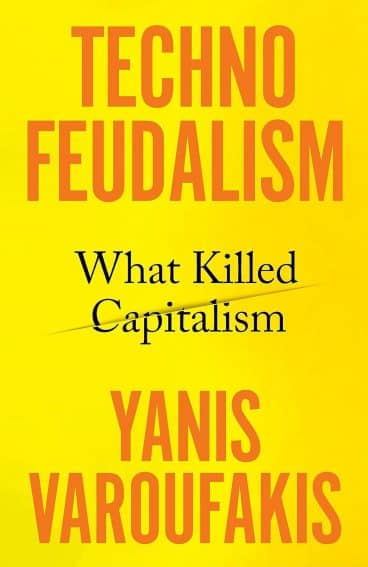Technofeudalism is Yanis Varoufakis’ term for the hold that social media, online commerce and cloud computing have over our lives. How they influence what we buy, shape what we think and oversee the world’s energy, transport, finance and security infrastructure.
Varoufakis, who taught economics at Sydney University for over a decade and was briefly Greek finance minister, claims that capitalism morphed into this new version of feudalism in the twenty first century. The feudal lords are Google, Apple, Microsoft, Amazon and Meta and we are the new serfs, freely giving the data that constitutes their raw material with every post and every purchase.

In his 2023 book ‘Technofeudalism: What Killed Capitalism’, Varoufakis argues that technofeudalism is distinct from capitalism as platforms have replaced markets and rents have replaced profits. Digital trading platforms may look like markets but they don’t function like markets as the flow of information between buyers and sellers is restricted. If a seller on Amazon tries to bargain directly with a buyer, in a few keystrokes they’re off the platform. And profits have been replaced by two forms of rent: subscriptions and ‘economic rent,’ the economists’ term for excess profits earned through restricted competition.
The big five profit by capturing, modifying and monetising our attention. The genius of the surveillance business model is that our data informs the promotion of goods, services, lifestyles, political preferences and social values that serve their interests. And as that data is free, Varoufakis argues labour costs are a tenth of those in conventional businesses.
Varoufakis argues two acts of government made technofeudalism possible. The first in April 1995 was privatising the internet, the digital equivalent of enclosing the commons to establish European feudalism under which tenant farmers paid up to a third of their harvest in rent. The second was central banks releasing trillions of dollars to keep economies afloat after the 2008 Global Financial Crisis (GFC) and the COVID pandemic, funds that quickly found their way to super profits in the cloud.
For a story of oppression, the style is very breezy and occasionally so are the facts. At one point Varoufakis claims without citing any sources:
“By 2020, cloud rents accruing to cloud capital accounted for much of the developed world’s aggregate net income” (p.135).
But according to the global data website Statista, the value of e-commerce, cloud computing and other cloud services in 2020 was five trillion dollars, just eight percent of the sixty trillion aggregate net income of the thirty six countries the United Nations defines as developed economies. Which raises the question: is capitalism really dead, or is technofeudalism just a more virulent strain, as economist Michel Luc Bellemare argues in Techno-capitalist-feudalism?
Hyperbole aside, the book’s strength is its lightning tour of economic history, tracing how we got into this mess. From the birth of capitalism to its gilded age at the end of the 19th century to The Great Depression, The New Deal and the collapse of the Bretton Woods agreement struck to rebuild after World War II, Varoufakis skates through the big events that shaped the present and draws two conclusions. First that, in times of crisis, national governments are quite capable of working together and making huge investments in the interests of the public good. Second that the door to technofeudalism was opened 20 years before the privatisation of the internet.
When President Nixon floated the dollar on 15 August 1971, it ushered in a series of reforms that delivered what Nobel Prize winning economist Joseph Stiglitz calls a superficial and misguided version of freedom: the freedom of markets over people. By tying the world to the US dollar, Bretton Woods achieved thirty years of stable exchange rates, high employment, low inflation, economic prosperity and massively reduced inequality. But it was based on the unsafe assumption that the US would remain a surplus economy, exporting more that it imported, and when the US started running trade deficits in 1965, the system collapsed.
Financial controls were progressively lifted, currency trading resumed, bankers went back to gambling with other peoples’ money, the gold price soared and along with it instability and inequality. The economics of John Maynard Keynes was replaced by the neoliberalism of Friedrich Hayek and Milton Friedman.

To correct the trade imbalance, US manufacturing moved offshore on the understanding foreign profits would be invested in the US finance, real estate and energy sectors. But the remedy proved worse than the disease, producing impoverished workers on both sides of the Pacific, the rust belt, a housing boom, the GFC and a disenfranchised middle America seeking revenge through closed borders, economic isolationism and nativist politics.
The road out of serfdom
Varoufakis’ remedy is a ‘cloud rebellion.’ A grand coalition between the traditional proletariat, the cloud proles (exploited big tech workers), the cloud serfs (everyone who donates data), and the vassal capitalists (those forced to rent space on big tech platforms to sell goods and services). The rebellion’s aim is to simultaneously democratise the internet, money, business and politics. A top-down transformation as radical as any of the failed revolutions of the 20th century and every utopia that’s been imagined since Thomas More coined the term 500 years ago.
An alternative that found favour in the wake of the 2008 GFC and again following the 2020 Economic Recession was a new Bretton Woods, proposed amongst others by the President of France, the Prime Minister of Greece and the head of the International Monetary Fund. But the problem remains, how to avoid the fragility of the original that effectively made the world’s economies branches of Wall Street?
Brazilian philosopher Roberto Unger has proposed a less prescriptive approach. He argues that any coalition capable of addressing major global issues from climate change to economic inequality must be voluntary and avoid a one-size-fits-all approach that converges on a single solution. Any attempt to form a global government would stifle creativity and open the door to autocracy. Instead he suggests humanity:
‘…develops its potential only by doing so in different directions, and can be unified only by being allowed to diverge… because our ability to create the new is our fundamental power.’
A willing collaboration that draws its strength and creativity from diversity and preserves national sovereignty not for its inherent value, but because the alternatives are worse.
But what, short of war, can manifest that will?
‘Technofeudalism: what killed capitalism’ by Yanis Varoufakis, Bodley Head 2023



